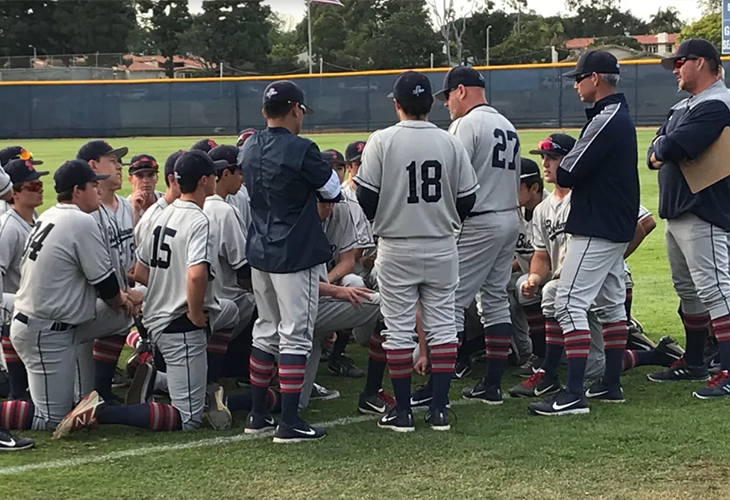 I have had the honor of coaching baseball for 46 years. During this period, I have to admit that I’ve conducted post-game meetings most of the time. At a recent coaches’ seminar, I discussed this process with a group of coaches, and it was truly enlightening for everyone involved. By the end of our session, here’s a sample of what our whiteboard looked like:
I have had the honor of coaching baseball for 46 years. During this period, I have to admit that I’ve conducted post-game meetings most of the time. At a recent coaches’ seminar, I discussed this process with a group of coaches, and it was truly enlightening for everyone involved. By the end of our session, here’s a sample of what our whiteboard looked like:
What was the subject matter that you centered on? Were you just getting things off your chest? Was your tone of voice and message measured? Were you ever out of control? Were you venting or teaching? Were you reasonable and fair with your evaluations? Were your players paying attention? What was the breakdown of negativity versus positivity? Did you regret anything you said? Did you embarrass anyone? How would you feel if you were a player listening to what you said?
I tried to be as honest and transparent in regards to my experiences over the years. I covered each topic with my recollections to the best of my ability. There were certainly times that I was venting, ranting, and out of control. I indeed regretted some things that I wish that I could have had back. At times, I questioned myself if the players actually benefited from our debriefings.
A few years following my retirement from San Jose State University, I was contacted by a former coach/teacher from a high school near my home. He had just been named Athletics Director and needed a baseball coach. I politely turned him down on two or three occasions before agreeing to meet with him. I had never coached in high school (except student teaching in 1975) and was reluctant to start now. I finally agreed and subsequently spent four highly enjoyable, unforgettable, successful seasons coaching at the high school level before stepping away. To this day, I still communicate with those boys and that A.D.
Now, the purpose of telling this chapter of my life in this article is because of the topic we are discussing. Since I had never coached in high school, I gave much thought to how I would communicate with my players. I was always considered a disciplinarian at all of my previous jobs: I established high standards for everyone and expected our people to strive to meet those standards. I now wanted to adjust to my new environment without compromising my philosophies and beliefs.
What I came up with was a new technique in post-game and post-practice debriefings and meetings. To be specific, what our staff did was come up with a unique way of getting our points across in a more relaxed, point-by-point calm methodology. I termed it the “Email Debriefings".
Simply put, we would save the “meat and potatoes” of our notes and teaching points and organize them in email form. The players were expected to read the email, digest it, and then confirm to me that they received/read it. We would then spend 12-15 minutes the next day for review with the players. I really believe our players thrived in this situation. Each player was prepared for our discussions and looked forward to engaging in these talks. For the majority of the time, these meetings were calm and matter of fact. On occasion, I would raise my tone if I felt a point had to be emphasized, but it was rare.
What I later learned was that the parents of the players were reading these emails as well, which actually helped us in our relationships with them. They understood exactly what we were trying to accomplish with their sons. Of course, the fact that we won at an 80 percent clip didn’t hurt!
Here are some of the key points of the emails:
- No cursing whatsoever
- No singling out of a player unless it was complimentary
- Detailed areas that were not up to our standards or expectations
- Review of game plan execution and team philosophy adherence
- Positive things that we did...win or lose.
I truly believe there can be significant growth and development with a solid post-game debriefing system. I made many mistakes during post-game talks early in my career that I wish I can have back, but I know I’ve continued to learn and make improvements to my coaching style. I think in today’s culture, coaches must make sure they recognize how crucial this part of the job is. Have a plan before you overreact or say something you regret. Being solid in this area can certainly make the experience for your players a productive one. Good luck! IP
Before retiring in 2012, Sam Piraro was the head coach at San Jose State University for 25 years. He won more than 800 games as the skipper of the Spartans. SJSU won three WAC championships and made a pair of NCAA Tournament berths, advancing to their first-ever College World Series in 2000. The ABCA Lifetime Member is currently an assistant coach for his brother, Stuart, at Lincoln High School in San Jose, and serves as Director of Coach and Player Development at Sirious Baseball, Inc.